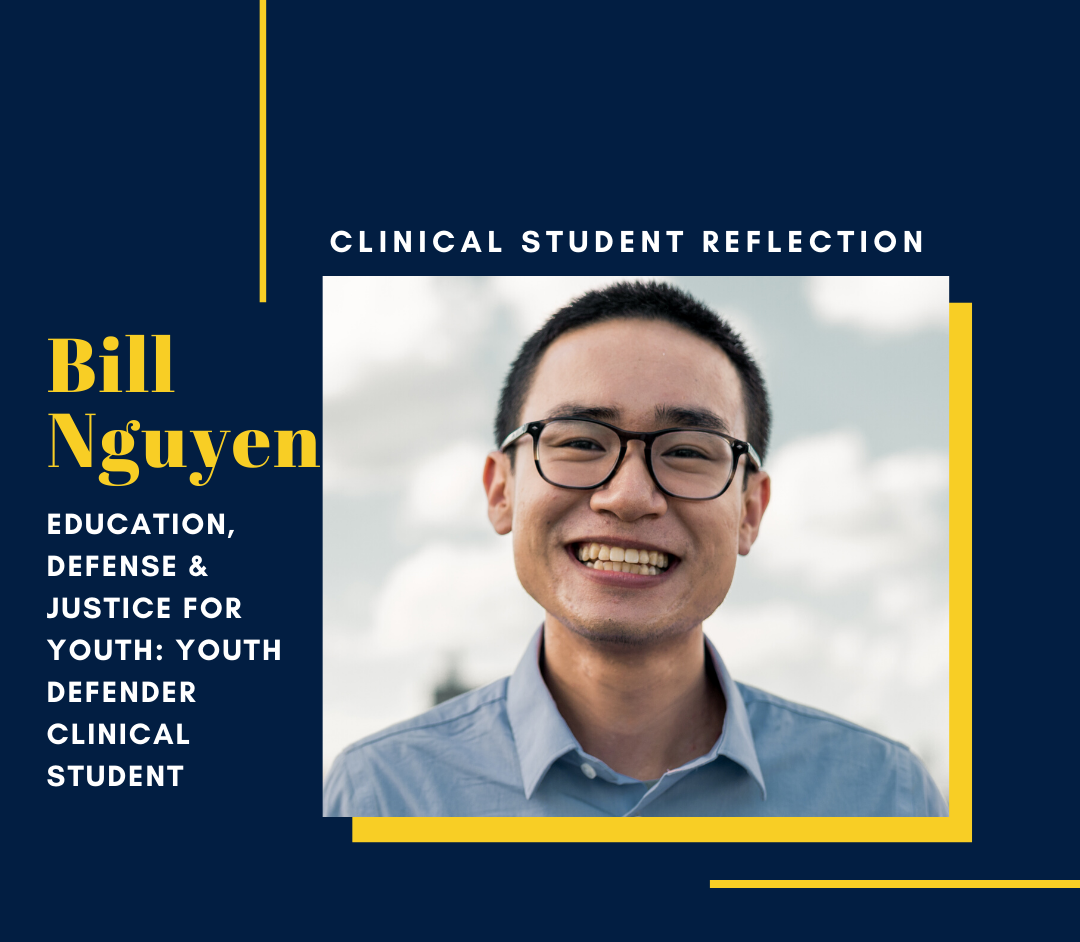
We kicked off Education, Defense, and Justice for Youth (EDJY) with the question I would ask myself all semester: How do you tell a story that doesn’t belong to you? During orientation, each student had to relay an anecdote to another student, who then shared it with the whole room. From this exercise, I learned how a microwave had inspired Emma, why Vanessa wanted to be a prosecutor, and that Henna loved her little sister more than she loved anyone else. I also began to understand what client-centered representation means—to see it in the way Alexis looked to her partners for confirmation that she was getting their stories right, and to feel it in the weight, equal parts gratitude and responsibility, that descended on me when I rose to speak.
In juvenile court, the story that the state tends to tell is this: The minor is dangerous. The minor doesn’t know what’s right for them. The minor should be placed under surveillance, sometimes away from their parents, until they have learned their lesson. This story is easy to tell, but the truth of a life—a life lived and not simply imagined—takes on so many dimensions that an easy telling is invariably false. I am reminded of the phrase “ceteris paribus”: all else being equal. “Ceteris paribus,” my problem sets in game theory used to read, “what is the dominant strategy given this information set?” The state’s position in court, often unmoored from my clients’ particularities, seemed to presume the same kind of logical vacuum: Ceteris paribus, what is the proper punishment given these allegations?
The work of EDJY asks a different set of questions. While writing his motion for informal probation, I asked John* what kind of person he dreamed of becoming. He puzzled over it, then told me that no one had ever posed that question to him. I felt more intrusive than flattered. Who was I, to believe that I was entitled to such intimate information from someone I barely knew? Then again, who was everyone else in John’s life, to believe that they could be a part of it without knowing the answer to that question?
As the EDJY attorneys—my supervisors Tony and Canción, along with Rosa, Oscar, and Whitney—tirelessly reminded us, EDJY’s work does not and cannot stop at the resolution of a legal issue. With every client, there is a range of dimensions to consider beyond the charges: their performance in school, their situation at home, any need for counseling. We have to consider the person they dream of becoming and the things that must be true for them to get there. To treat a client as a legal issue alone blots out these shifting pieces, of which the charging petition is only one small part. It also encourages a diagnostic approach that elides a client’s complexities, excising who they were at a single moment from the rest of who they are and who they might become. In contrast, EDJY urges a model of holistic advocacy that tries to take account of the whole person.
The material impact of this holistic advocacy is clear enough — clients get social services in addition to legal help — but there is a narrative and relational element to that impact, too. I remember noticing this for the first time when I left the courthouse with Richard*. We’d just finished a hearing in which both of us had spoken. Our relationship was good enough, I thought, or as good as it would get, but it grew unexpectedly after that hearing. I felt the signal of his renewed trust like the blast of wind in our faces. He confided in me a hobby I didn’t know he had; he smiled goodbye and returned my texts and calls faster than ever in the following weeks. I can’t say why for sure, but it must have been the sense of being heard. He might have felt heard when I conveyed to the court his life as he had presented it to me in our private conversations, and — more importantly — he might have felt heard when he himself was able to speak in court. That’s something I learned in EDJY: to listen deeply and, whenever possible, to let clients speak for themselves.
The easy recollection above is not to suggest that the work was easy. It was hard, and it took some fortitude on my part. But what helped me most of all to last was outside of me: guidance from my EDJY family. I would not have grown as much as I did in EDJY without the abiding support of my supervisors and colleagues. I did hope for more privacy at first. To be within earshot of all the other students in clinic made me self-conscious about the conversations I had, the windows I’d pulled up on my computer screen, even my lazy posture. I changed my mind upon replacing the phone after the first call I ever took on the EBCLC landline and hearing a chorus of chair swivels followed by congratulations. It had not been an important or difficult call, but the gesture moved me nevertheless.
I am especially grateful for the mentorship of Tony and Canción. Nothing I did escaped their detailed feedback, which reached not only the structure of my oral arguments and the substance of my motions but also the cadence of my voice and the syntax of my written sentences. Contrary to what I once believed about lawyers, I saw Tony and Canción regularly use their critical faculties. They modeled a way of telling stories for a living that I hadn’t seen before coming to EBCLC. And their respect for my input and autonomy, even as a student, recalled a common refrain: “You are the expert of your own experience.” It’s something we liked to tell clients, but in EDJY I learned to believe the same for myself.
* Alias used to protect client confidentiality